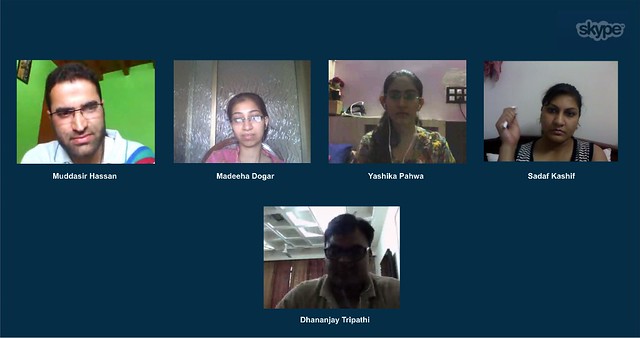By TCN News,
New Delhi: Aaghaz-e-Dosti’s eight-week virtual peace building course, Friends Beyond Borders, concluded with interaction of fellows hailing from different parts of India and Pakistan with Dr. Meenakshi Chhabra (Lesley University, Cambridge, USA), Dr. Dhananjay Tripathi (South Asian University, India) and Dr. Zahid Shahab Ahmed (NUST, Pakistan).

Friends Beyond Borders is a virtual peace building course wherein an Indian and a Pakistani has been paired to be “Indo-Pak E-Pals”. Through this eight-week interactive course, the fellows are guided by a mentor who gives them weekly plans/activities based on a curriculum designed to familiarize them with the ‘other’, its culture, society, politics and the existence of divergent narratives. In addition to resources prepared and prescribed by Aaghaz-e-Dosti to develop their understanding, the fellows converse with each other on the given theme.
This was the first session of Friends Beyond Borders. The first session had 24 fellows from India and Pakistan. The fellows and also the mentors were from Delhi, Chattisgarh, Punjab, Haryana, Lucknow, Meerut, Kashmir, Vadodara, Mumbai and Pune in India and Lahore, Rawalpindi, Islamabad, Peshawar, Federally Administered Tribal Areas (FATA), Karachi and Hyderabad in Pakistan. Their occupations included college students, research students, advocates, journalists, NGO workers, activists and businessmen.
In addition to the regular and theme-based conversations, the fellows also interacted with academicians through video conferencing. The academicians were Dr. Meenakshi Chhabra from Department of Interdisciplinary Studies, International Higher Education and Intercultural Relations, Lesley University (USA), Dr. Dhananjay Tripathi from Department of International Relations, South Asian University (India) and Dr. Zahid Shahab Ahmed from Department of Peace and Conflict Studies, NUST – National University of Sciences and Technology (Pakistan).
The academicians spoke on different topics that included the Indo-Pak relations and the influence of/on International and South Asian Politics, the role of education as a constraint in peace building, the narrative of partition in both countries, the role of religion extremism and the role of people. The sessions were interactive.
Dr. Dhananjay Tripathi from South Asian University spoke on the political relations between India and Pakistan and the influence of/on International and South Asian politics. He talked about the major conflicts between the two countries, the perspectives of both sides. He talked about the victims of conflict and the need for conflict resolution for the benefit of both countries. Peace is the prerequisite for development on both sides.
Muddasir Hasan, a fellow from J&K (India), talked about the sufferings of the Kashmiri people. While Kashmir is seen as a land of dispute, no-one is thinking about the inhabitants and how they are suffering immensely because of the conflict.
Salma Noureen, a fellow from KPK (Pakistan), had highlighted the issue of how peaceniks are often regarded as “anti-nationals” and “traitors”. Dr. Tripathi responded that it is the peaceniks who are patriots in real terms. By demanding peace and dialogue, they denounce conflict or the loss of the lives of their countrymen and the deterioration of economy.
Dr. Meenakshi Chhabra talked about “Education and Conflict: Possibilities of peace through Education”. She talked about the dominant narratives of partition existing on both sides. Partition remains under-studied in both countries. Both countries have developed a biased, one-sided and opposing perspective on partition. She talked about the damage that this has done on the mindset of people on both sides. She shared her findings from the research that she has undertaken on this topic wherein she had interviewed three generations of Pakistanis and explored how they viewed partition. She had shared an interesting observation that the people who have actually experienced partition and suffered do not have hatred for the ‘other’.
The fellows Fayaz Shaikh from Pune (India) and Muhammad Zuhaib Arain from Hyderabad (Pakistan) had also shared the narratives that they have studied. They talked about how the partition narrative still holds importance. The people still believe and shape their understanding of not only the ‘other’ country but the ‘other’ religious community on the basis of the narrative that they have been taught.
Dr. Zahid Shahab Ahmed spoke on “religious extremism and Indo-Pak conflict”. He spoke about how in both countries, communalism and religious extremism continues to be a major challenge. In both countries, any debate or thinking on religion is not acceptable. Religion continues to remain in the hands of those with a political agenda.
Richard Salafia, a fellow from Mumbai (India), regarded the bias in history writing to be one of the reasons for this.
Faisal Latif, a fellow from Islamabad (Pakistan), also talked about the impact of the stereotypes and bias sustained by education and popular media. There is a need for us to think critically about the ‘difference’ that is sought.
Conveners of Aghaz-e-Dosti informed that this initiative will continue. The second session is expected to commence in the later part of this year.

